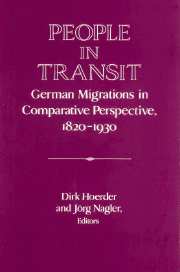Book contents
- Frontmatter
- Introduction
- PART I CONTINUITY AND COMPLEXITY: MIGRATIONS FROM EAST ELBIAN GERMANY AND GALICIAN POLAND
- 1 German Emigration Research, North, South, and East: Findings, Methods, and Open Questions
- 2 Colonist Traditions and Nineteenth-Century Emigration from East Elbian Prussia
- 3 Overseas Emigration from Mecklenburg-Strelitz: The Geographic and Social Contexts
- 4 Emigration from Regierungsbezirk Frankfurt/Oder, 1815-1893
- 5 Preserving or Transforming Role? Migrants and Polish Territories in the Era of Mass Migrations
- Part II Internal German Migrations and In-Migrations
- PART III WOMEN'S MIGRATION: LABOR AND MARRIAGE MARKETS
- PART IV ACCULTURATION IN AND RETURN FROM THE UNITED STATES
- 18 Migration Past and Present - The German Experience
- 19 Research on the German Migrations, 1820s to 1930s: A Report on the State of German Scholarship
- Index
5 - Preserving or Transforming Role? Migrants and Polish Territories in the Era of Mass Migrations
Published online by Cambridge University Press: 05 January 2013
- Frontmatter
- Introduction
- PART I CONTINUITY AND COMPLEXITY: MIGRATIONS FROM EAST ELBIAN GERMANY AND GALICIAN POLAND
- 1 German Emigration Research, North, South, and East: Findings, Methods, and Open Questions
- 2 Colonist Traditions and Nineteenth-Century Emigration from East Elbian Prussia
- 3 Overseas Emigration from Mecklenburg-Strelitz: The Geographic and Social Contexts
- 4 Emigration from Regierungsbezirk Frankfurt/Oder, 1815-1893
- 5 Preserving or Transforming Role? Migrants and Polish Territories in the Era of Mass Migrations
- Part II Internal German Migrations and In-Migrations
- PART III WOMEN'S MIGRATION: LABOR AND MARRIAGE MARKETS
- PART IV ACCULTURATION IN AND RETURN FROM THE UNITED STATES
- 18 Migration Past and Present - The German Experience
- 19 Research on the German Migrations, 1820s to 1930s: A Report on the State of German Scholarship
- Index
Summary
After 1795, Polish territories belonged to the Russian Empire, the Austrian Empire, or to the Kingdom of Prussia. A complex set of factors motivated many inhabitants of Polish territories to migrate. First and foremost was the desire to better one's material situation. Rapid population growth, overpopulation, and lack of land characterized emancipated Polish villages (enfranchisement of peasants took place earliest in Prussia, in Austrian Poland in 1848, in Russian Poland in 1864). In this essay, I focus mainly on developments in Russian and Austrian Poland.
“From all possible angles [emigration] affected peasants' personalities, their view of the world, people, and social relations, created a new attitude toward work and material goods, modernized their attitudes toward life, their goals and their wishes, and changed the appearance of people, houses, whole villages. Emigration caused a revolutionary transformation of peasants' personality,” Jan Borkowski has emphasized. Wincenty Witos, peasant leader and politician, was more moderate: “If the Polish village took a big step toward progress, if it rose out of the fetters of political dependence and backwardness of former economic poverty, the change was due to emigration.” Wladyslaw Orkan, a Polish writer, hesitated: “It is so difficult to strike a proper balance and ascertain whether America brought our village greater assets or liabilities. But it seems to me that the benefits have predominated.“ Which of these authors is right?
- Type
- Chapter
- Information
- People in TransitGerman Migrations in Comparative Perspective, 1820–1930, pp. 101 - 124Publisher: Cambridge University PressPrint publication year: 1995
- 1
- Cited by



